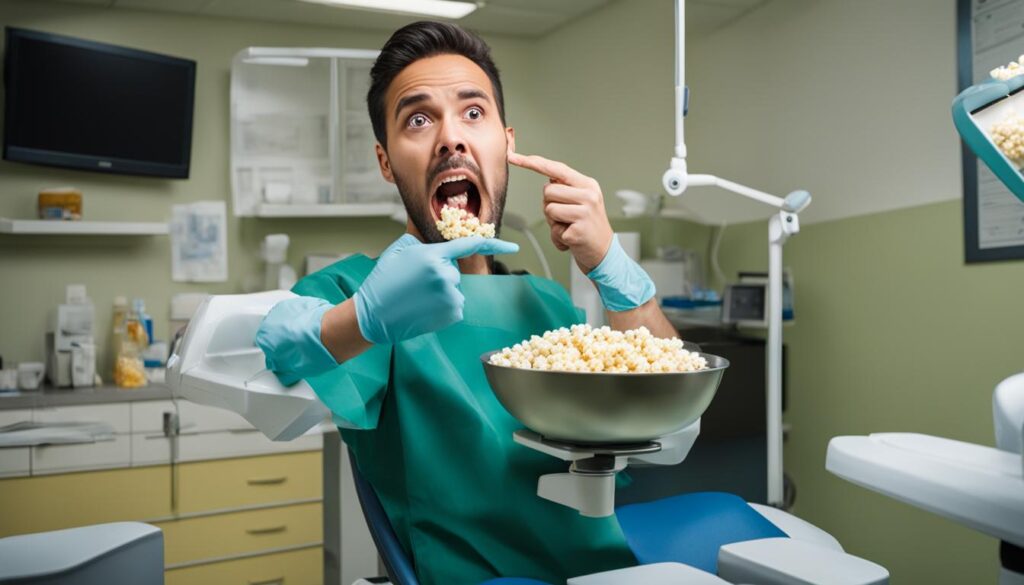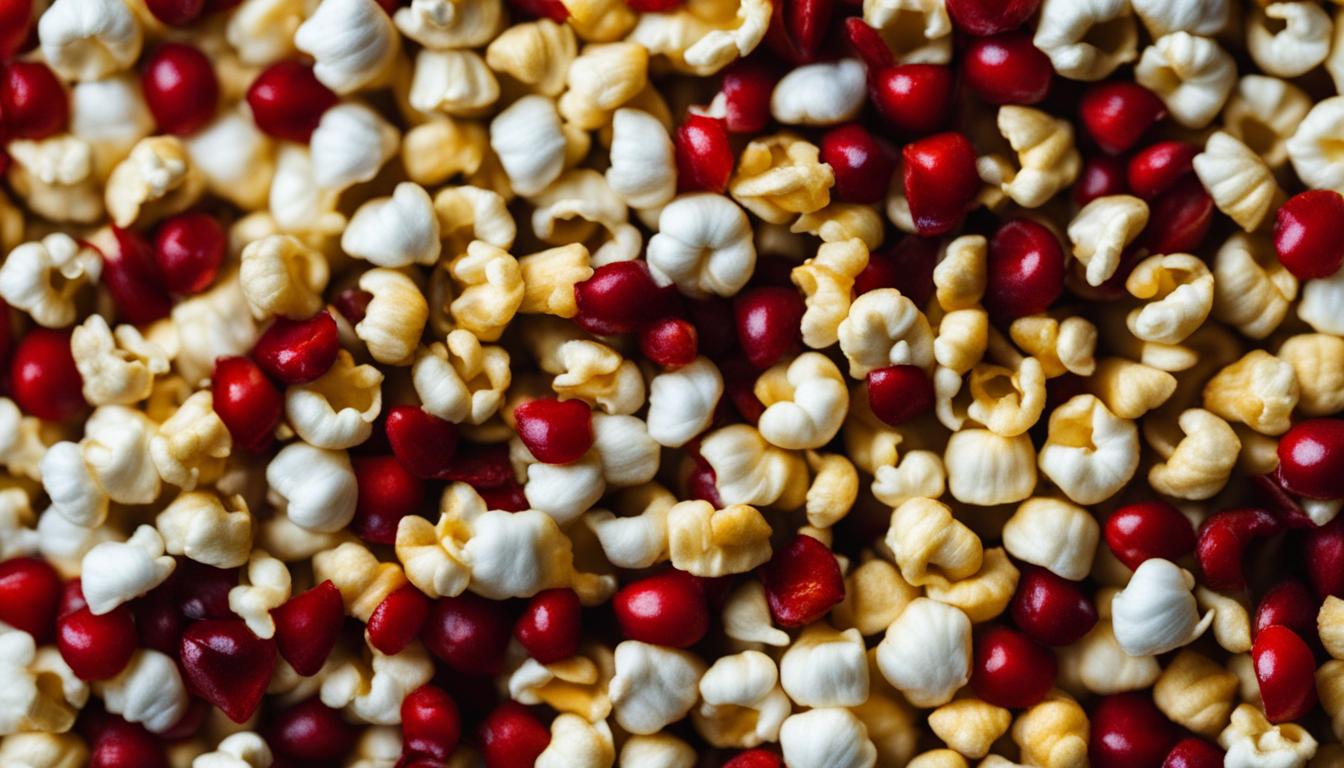When it comes to snacking, popcorn is a popular choice for many. Its light and crunchy texture, paired with various flavor options, make it a go-to treat for movie nights or afternoon munchies. However, while popcorn can be a nutritious snack option, it may not be suitable for everyone. In this article, we will explore the health risks associated with popcorn and who should approach it with caution.
Popcorn may seem harmless, but there are several health factors to consider. For individuals with popcorn allergies or intolerances, consuming this beloved snack can lead to unpleasant symptoms and digestive issues. Furthermore, certain chemicals found in microwave popcorn can pose risks to our well-being. Diacetyl, a chemical used in artificial butter flavoring, has been linked to a condition known as popcorn lung, which can cause lung inflammation.
It’s also important to note that microwave popcorn tends to be high in unhealthy saturated fats and sodium. These can contribute to weight gain and increase the risk of high blood pressure, which can lead to cardiovascular problems.
While it’s true that popcorn can offer health benefits, such as being a good source of dietary fiber and containing antioxidants, it’s crucial to make informed choices when selecting the right type of popcorn and preparation methods. By understanding the potential health risks and alternatives, you can enjoy this snack responsibly.
Key Takeaways:
- Popcorn may not be suitable for individuals with popcorn allergies or intolerances, as it can cause unpleasant symptoms and digestive issues.
- Chemicals like diacetyl found in artificial butter flavoring used in microwave popcorn can lead to lung inflammation, known as popcorn lung.
- Microwave popcorn is high in saturated fats and sodium, which can contribute to weight gain and increase the risk of high blood pressure.
- Choose the right type of popcorn and preparation methods to maximize its health benefits and minimize potential risks.
- Be mindful of portion sizes and maintain good dental hygiene, as popcorn can pose risks to dental health and dental work.
The Health Benefits of Popcorn
When it comes to snacking options, popcorn is often overlooked. However, this humble snack actually offers several health benefits that may surprise you. Let’s take a closer look at the positive aspects of popcorn and why it can be a great addition to a balanced diet.
Fiber and Weight Loss
One of the key health benefits of popcorn is its high fiber content. Fiber is essential for maintaining a healthy digestive system and can help promote weight loss. As a whole grain, popcorn contains both soluble and insoluble fiber, which can keep you feeling full and satisfied for longer periods of time. Additionally, the crunchiness of popcorn can give you a satisfying snack experience without the need for unhealthy additives or excess calories.
Antioxidants for Better Health
Did you know that popcorn is a great source of antioxidants? Antioxidants are important for fighting off harmful free radicals in the body and reducing the risk of chronic diseases. Popcorn contains a type of antioxidant called phenolic acids, which have been linked to better blood circulation and a lower risk of heart disease, certain types of cancer, and other ailments. By incorporating popcorn into your diet, you can enjoy these antioxidant benefits and support your overall health.
Choosing the Right Popcorn
While popcorn offers numerous health benefits, it’s important to make smart choices when selecting your popcorn. Opt for air-popped popcorn or make your own at home using healthy oils like olive oil or avocado oil. These alternatives are lower in saturated fats and sodium compared to pre-packaged microwave popcorn or movie theater popcorn. By making these simple substitutions, you can enjoy the health benefits of popcorn while minimizing potential risks.
In summary, popcorn is not only a delicious and satisfying snack, but it also offers several health benefits. With its high fiber content and antioxidant properties, popcorn can contribute to weight loss, digestive health, and overall well-being. By making informed choices and opting for healthier popcorn options, you can enjoy this nutritious snack without compromising your health.
Choosing the Right Popcorn

When it comes to enjoying popcorn, making the right choices can help us maximize its nutritional benefits. Here are some healthy popcorn options to consider:
Air-Popped Popcorn
Air-popped popcorn is a great choice because it doesn’t require the use of oil, making it lower in calories and fat. It provides a light and crunchy texture that many people enjoy. You can season it with your favorite herbs and spices to add flavor without adding unnecessary calories.
Homemade Popcorn
Making popcorn at home gives you full control over the ingredients and cooking methods. You can choose to cook it on the stovetop using a small amount of healthy oil like olive oil or avocado oil. This allows you to add a touch of richness and flavor while still keeping it relatively healthy.
Microwave Popcorn Risks
While microwave popcorn is convenient, it may come with some risks. Some brands contain artificial flavors, processed salt, and potentially harmful chemicals like PFOAs, PFOSs, and diacetyl. These chemicals can leach into the popcorn and the body, posing potential health concerns. It is advisable to opt for healthier alternatives to reduce exposure to these risks.
By choosing air-popped popcorn or making homemade popcorn, we can enjoy a delicious and nutritious snack without worrying about unnecessary additives or chemicals. It’s important to remember that moderation is key, and portion control plays a significant role in maintaining a healthy diet. So, let’s make informed choices and savor the goodness of popcorn in a way that promotes our overall well-being.
Popcorn and Allergies or Intolerances

Popcorn can be a delicious and satisfying snack for many, but it’s important to be aware of potential allergies or intolerances that some individuals may have. Allergies to popcorn, or specifically to corn, can cause a range of symptoms including itching, hives, swelling, and difficulty breathing. These allergic reactions occur when the body’s immune system mistakenly identifies certain proteins in popcorn as harmful substances.
If you suspect you have a popcorn allergy, it is advisable to consult with a healthcare professional for a proper diagnosis. They can perform tests to determine the specific allergens triggering your symptoms. Additionally, individuals with corn allergies should be cautious of cross-contamination and choose popcorn that is processed in a dedicated facility to avoid any adverse reactions.
Popcorn intolerance, on the other hand, is not an immune response but rather a difficulty in digesting certain components of popcorn. It can lead to digestive issues such as bloating, gas, and diarrhea. If you experience these symptoms after consuming popcorn, it may be worth exploring the possibility of popcorn intolerance and discussing it with a healthcare provider to find suitable alternatives.
Potential Gluten-Free Popcorn Options
- Plain, air-popped popcorn: This is a safe option for individuals following a gluten-free diet as long as there is no cross-contamination with gluten-containing ingredients during processing.
- Homemade popcorn: By making your own popcorn at home, you have control over the ingredients used and can ensure they are gluten-free. Use gluten-free oils and seasonings to add flavor if desired.
- Gluten-free popcorn brands: Some popcorn brands specifically label their products as gluten-free, providing a convenient option for those with gluten sensitivities or celiac disease.
Overall, it’s important to be mindful of potential allergies, intolerances, and dietary restrictions when enjoying popcorn. By choosing the right popcorn options and being aware of ingredient labels, individuals can still indulge in this tasty snack while keeping their health needs in mind.
Popcorn and Dental Health

When it comes to enjoying a delicious bowl of popcorn, it’s important to be aware of the potential risks it can pose to your dental health. While popcorn is a popular snack, its hard kernels and fibrous strands can easily get stuck between your teeth or in dental work, such as fillings or braces. This can lead to discomfort, tooth decay, and even damage to your dental work.
Tooth decay is a common concern associated with popcorn consumption. The hard kernels can lodge into crevices and gaps in your teeth, providing a perfect breeding ground for bacteria. Over time, this can lead to cavities and other dental issues. Additionally, the fibrous strands of popcorn can get wedged between your teeth, making it difficult to remove with regular brushing and flossing.
If you have braces, extra caution is required when eating popcorn. The kernels can easily become trapped in the brackets, wires, or bands, causing damage and potentially prolonging your orthodontic treatment. It is essential to avoid chewing on popcorn kernels or any other hard foods that can put excessive pressure on your braces.
Preventing Dental Problems
While popcorn can pose dental risks, you don’t have to completely avoid this tasty snack. By following a few simple tips, you can still enjoy popcorn while minimizing the potential damage to your teeth:
- Opt for air-popped popcorn or a homemade version cooked with minimal oil. This reduces the risk of consuming excessive fats and oils that can contribute to dental problems.
- Avoid adding sugary toppings or caramel coatings to your popcorn, as they can increase the likelihood of tooth decay.
- If you have braces, consider enjoying alternative snacks that are softer and less likely to get stuck in your orthodontic appliances.
- After eating popcorn, make sure to thoroughly brush and floss your teeth to remove any trapped debris and maintain good oral hygiene.
By being mindful of your dental health and following these guidelines, you can still indulge in the joy of popcorn without compromising your smile.
Conclusion
After examining the health risks associated with popcorn, it is important to make informed choices about the popcorn we consume. While popcorn can be a nutritious and delicious snack option, certain types of popcorn may pose potential health concerns. Microwave popcorn, in particular, may contain chemicals that can leach into our bodies and contribute to adverse health effects. Additionally, the artificial butter flavoring found in some microwave popcorn brands can lead to respiratory problems.
To mitigate these risks, we recommend opting for healthier alternatives when indulging in popcorn. Air-popped popcorn or homemade popcorn cooked with healthy oils like olive oil or avocado oil can provide a flavorful and nutritious option. By preparing our popcorn at home, we have better control over the ingredients we use and can avoid excessive sodium and unhealthy fats often found in commercial popcorn products.
Furthermore, it is crucial to be mindful of any allergies or intolerances we may have. Some individuals may experience adverse reactions to popcorn or corn, ranging from mild symptoms like bloating and gas to more severe allergic reactions. For those with corn allergies or following a gluten-free diet, it is necessary to select popcorn that is free from cross-contamination and processed in dedicated facilities.
In conclusion, while enjoying a bowl of popcorn can be a delightful experience, it is vital to be aware of the potential health risks and make informed choices. By selecting healthier popcorn options, being mindful of allergies, and maintaining good dental hygiene, we can continue to savor the benefits of this beloved snack without compromising our well-being.
FAQ
Who should not eat popcorn?
Popcorn should be avoided by individuals with popcorn allergies or intolerances, as well as those with corn allergies or following a gluten-free diet.
What are the health risks associated with popcorn?
Popcorn can pose risks such as exposure to potentially harmful chemicals, high levels of saturated fats and sodium, and potential respiratory problems from chemicals found in microwave popcorn.
What are the health benefits of popcorn?
Popcorn is a good source of dietary fiber, promotes weight loss, and contains antioxidants called phenolic acids that have various health benefits including better blood circulation and a lower risk of chronic diseases.
How can I choose the right popcorn?
Healthy popcorn options include air-popped popcorn or homemade popcorn cooked with healthy oils. Microwave popcorn and movie theater popcorn may contain artificial flavors, processed salt, and potentially harmful chemicals.
What should I know about popcorn allergies or intolerances?
Popcorn allergies can cause symptoms like itching, swelling, and difficulty breathing, while popcorn intolerance can result in digestive issues. It is important to choose popcorn that is free from cross-contamination and processed in a dedicated facility.
Can popcorn affect dental health?
Popcorn kernels can get stuck between teeth and in dental work, causing tooth decay. Individuals with braces should be cautious when eating popcorn to prevent damage to the brackets or wires, and it is recommended to brush and floss thoroughly after consuming popcorn for good dental hygiene.

Leave a Reply